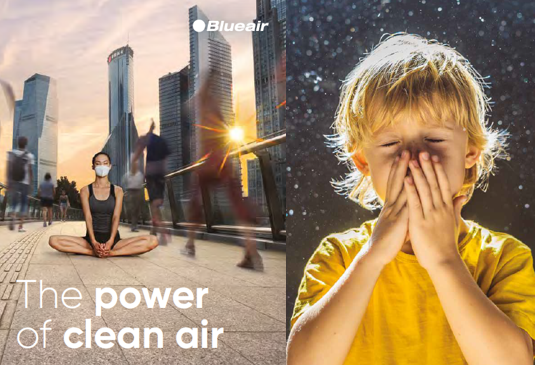Seven out of 10 Millennials, Gen Z and Gen X worry about the air they breathe at home and work

According to a recent global survey by independent research firm YouGov on behalf of Blueair, a world-leader in air purification solutions, there is an increased concern for indoor air quality with seven out of ten people across the globe worrying about the air they breathe in their homes, at their workplace, in their children’s schools and in other public places such as gyms, hotels and restaurants.
Indoor air is up to five times more polluted than outdoor air according to, among others, the US Environmental Protection Agency. Considering that people spend about 90% of their time indoors, it is not surprising that they worry about the air that they breathe indoors.
“We see three emerging trends from the research,” says Sara Alsen, Chief Purpose Officer at Blueair: “First, there is an increased concern for indoor air pollution and how that will affect our health and well-being; secondly, children are the focus of concern and people across the globe agree that clean air is important for childrens’ physical and cognitive health as well as for their sleep; thirdly, access to clean air increasingly influences lifestyle choices such as where to live, work, eat out and go on holiday.”
Dust, chemicals, bacteria and virus
Across generations and geographies people worry that the air they breathe indoors affects their health and wellbeing and that of their families: Dust, chemicals, bacteria and viruses in the air are the focus of concern, with dust being the main concern in homes, chemicals in the workplace, and bacteria and virus in public places such as schools. In the UK 78% of people are worried most about dust in their homes – more than any of the other countries surveyed. The British also worry more about germs in the home than other countries: 65% of people in the UK say they worry about bacteria and viruses in the home, compared with 54% or less worrying in India, US, China and South Korea. 49% of Brits are also concerned about chemicals in the home. The pollutants people worry about in their indoor air are smoke, pollen, pet dander, PM2.5 and microplastics. Among the rooms in the home, the bedroom is the most important for clean air.
Children’s health and learning in focus
More than nine in 10 parents think that clean air plays an important role in ensuring the physical health of their children. What people worry most about is that their children will develop a cold, the flu, allergies or respiratory illnesses as a result of breathing polluted air. Nearly nine in 10 think clean air is important for a child’s development and learning ability. In the UK six in 10 worry most about germs in the indoor air at children’s schools. Most people also think that polluted air has a negative impact on sleep – their own and their children’s. In the UK 88% of people believe that clean air is important to help their children sleep deeper. The top three actions parents in the UK take to help protect their children’s lungs is to avoid chemicals at home (28%), avoid highly trafficked roads (23%) and to have an air purifier in the children’s bedroom (7%).
Air pollution limits personal freedom
Nine out of 10 people in China, India and South Korea chose holiday destinations based on access to clean air. Some 74% of people in the US and 54% in the UK do the same. The same is true for decisions on where to live and where to work. More than nine in 10 people in all countries except for the UK (six out of 10) also choose schools for their children based on access to clean air. A third of people in the UK say access to clean air is important when choosing a gym, 47% when choosing where to work, and 53% when choosing a restaurant.
“We see a strong consumer need for indoor air purification solutions”, said Sara Alsen, Chief Purpose Officer at Blueair. “People across the globe are increasingly worried about the air they breathe in their homes and workplaces. The good news is that indoor pollutants can easily be removed. In addition to the most common pollutants such as dust, chemicals and germs, our air purifiers remove smoke, PM2.5, pet dander, microplastics, formaldehyde and pollen”.




